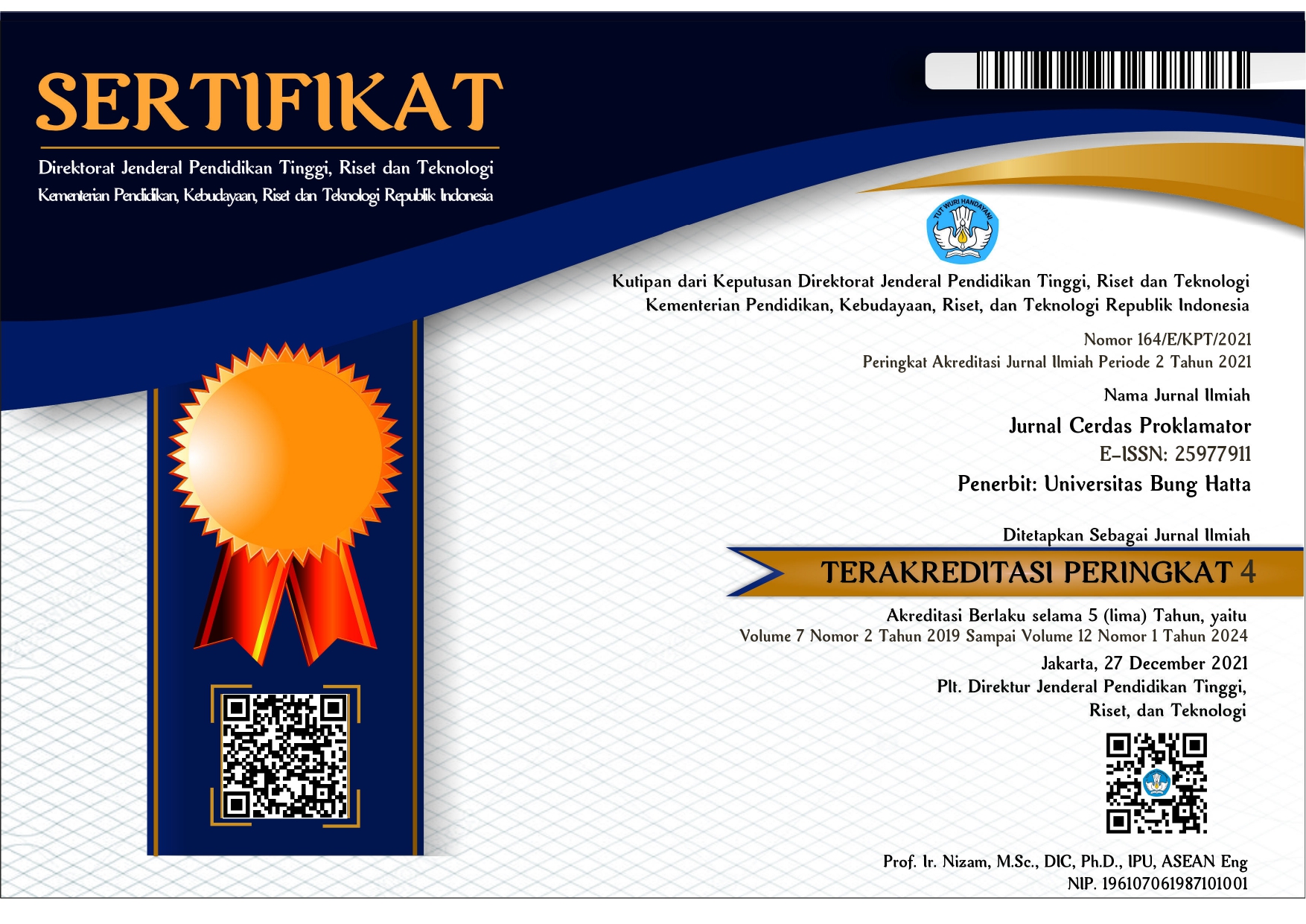DAMPAK MOTIVASI BELAJAR TERHADAP HASIL BELAJAR PENDIDIKAN JASMANI SISWA SD NEGERI 24 PERUPUK TABING PADA MASA PANDEMI COVID-19
DOI:
https://doi.org/10.37301/cerdas.v10i1.116Keywords:
Motivasi Belajar dan Hasil BelajarAbstract
Penelitian ini bertujuan untuk menganalisis dampak dari motivasi belajar sebagai faktor untama yang berpengaruh terhadap hasil belajar pendidikan jasmani. Pembelajaran afektif dilaporkan menjadi salah satu faktor kunci dalam pencapaian hasil belajar pendidikan jasmani selama masa pandemi covid-19. Sebuah desain korelasi dengan mengunakan metode asosiatif causal telah digunakan untuk mengumpulkan informasi dari sampel 35 kelas V SD Negeri 24 Parupuk Tabing Kota Padang. Pengumpulan data dilakukan melalui kuesioner dan diskusi kelompok terfokus. Selanjutnya, untuk memeriksa pengaruh dari studi ini, kami memanfaakan IBM SPSS software. Hasil menunjukkan bahwa, terdapat perbedak korelasi anatara laki-laki dan perempuan antara hasil belajar pendidikan jasmani dari prediktor motivasi belajar. Kekuatan pengaruh langsung mengidentifikasi bahwa secara signifikan perpengaruh positif motivasi belajar terhadap hasil belajar pendidikan jasmani di Masa Pandemi Covid-19. Oleh sebab itu, komponen motivasi belajar menjadi faktor utama dalam hasi belajar pendidikan jasmani.
References
Bui, K. L., Maia, N., Saey, D., Dechman, G., Maltais, F., Camp, P. G., & Mathur, S. (2019). Reliability of quadriceps muscle power and explosive force, and relationship to physical function in people with chronic obstructive pulmonary disease: an observational prospective multicenter study. Physiotherapy Theory and Practice. https://doi.org/10.1080/09593985.2019.1669233
Crocker, P. R. E., Eklund, R. C., & Kowalski, K. C. (2000). Children’s physical activity and physical self-perceptions.Journal of SportsScience, 18, 383–394.http://dx.doi.org/10.1080/02640410050074313.
Duda, J. L., Chi, L., Newton, M. L., & Walling, M. D. (1995). Task and ego orientation and intrinsic motivation in sport. International journal of sport psychology.
Fiske, S. T., Cuddy, A. J. C., & Glick, P. (2007). Universal dimensions of social cognition: warmth and competence. Trends in Cognitive Sciences.
Hamzah B. Uno, (2006). Teori Motivasi dan Pengukurannya. Jakarta: PT. Bumi Aksara.
Jamil, H., & Azra, F. I. (2014). Pengaruh Lingkungan Keluarga dan Motivasi Belajar Siswa terhadap Hasil Belajar Akuntansi Siswa Kelas X SMK Negeri 1 Solok Selatan. Journal of Economic and Economic Education Vol, 2(2), 85-98.
Lage, M. J., Platt, G. J., & Treglia, M. (2000). Inverting the classroom: A gateway to creating an inclusive learning environment. The journal of economic education, 31(1), 30-43.
Marwan, D. (2013). Pengaruh Motivasi belajar Terhadap Hasil Belajar Siswa Kelas X Mata Pelajaran IPS di SMK. Jurnal Pendidikan dan Pembelajaran Khatulistiwa, 3(1).
Mulyasa, E. (2012). Standar Kompetensi dan Sertifikasi Guru. Bandung: PT. Remaja Rosdakarya.
Nopiyanto, Y. E., & Raibowo, S. (2020). Penerapan model pembelajaran Jigsaw untuk meningkatkan motivasi dan hasil belajar mahasiswa penjas pada mata kuliah filsafat penjas dan olahraga. Journal Of Sport Education (JOPE), 2(2), 61-69.
Ntoumanis, N. (2005). A prospective study of participation in optional school physical education using a self-determination theory framework. Journal of educational psychology, 97(3), 444.
Nurmala, D. A., Tripalupi, L. E., & Suharsono, N. (2014). Pengaruh motivasi belajar dan aktivitas belajar terhadap hasil belajar akuntansi. Jurnal Pendidikan Ekonomi Undiksha, 4(1).
Raudsepp, L., & Liblik, R. (2002). Relationship of perceived and actual motor competence in children.Perceptual & Motor Skills,94(3), 1059–1070.
Reeve, J. (2009). Why teachers adopt a controlling motivating style toward students and how they can become more autonomy supportive. Educational psychologist, 44(3), 159-175.
Ryan, R. M., & Deci, E. L. (2000). Intrinsic and extrinsic motivations: Classic definitions and new directions. Contemporary educational psychology, 25(1), 54-67.
Saputra, H. D., Ismet, F., & Andrizal, A. (2018). Pengaruh motivasi terhadap hasil belajar siswa SMK. Invotek: Jurnal Inovasi Vokasional dan Teknologi, 18(1), 25-30.
Ting Lin, Yen., & Min Jou. (2013). Integrating Popular Web Applications In Classroom Learning Environments And Its Effects On Teaching, Student Learning Motivation And Performance. The Turkish Online Journal of Educational Technology, April 2013, volume 12 Issue 2.
Wahyuni, D. S. (2016). Pengaruh efikasi diri, cara belajar, persepsi siswa tentang komunikasi guru dan persepsi siswa tentang perhatian orangtua terhadap hasil belajar siswa kelas XI MAN di Kota Palu. Matematika dan Pembelajaran, 4(2), 21-42.
Warti, E. (2016). Pengaruh motivasi belajar siswa terhadap hasil belajar matematika siswa di SD Angkasa 10 Halim Perdana Kusuma Jakarta Timur. Mosharafa: Jurnal Pendidikan Matematika, 5(2), 177-185.
Yazid, T. P., & RIDWAN, R. (2018). Proses Persepsi Diri Mahasiswi Dalam Berbusana Muslimah. An-Nida', 41(2), 193-201.
Yu J, Sit CHP, Capio CM, et al. (2016). Fundamental movementskills proficiency in children with developmental coordin-ation disorder: does physical self-concept matter?. DisabilRehabil;38:45–51.
Downloads
Published
Issue
Section
License
Copyright (c) 2022 Jurnal Cerdas Proklamator

This work is licensed under a Creative Commons Attribution 4.0 International License.
Copy right in each article belong to the authors.
1. The author acknowledges that the Journal Cerdas Proklamator as a publisher who publishes for the first time with the
Creative Commons Attribution 4.0 International License.
2. The Author can enter the writing separately, manage the non exclusive distribution of manuscripts that have been published in this journal into the other versions (eg sent to the repository of the author's institution, publication in book, etc), by acknowledge that the manuscript was first published in the Jurnal Cerdas Proklamator.






















